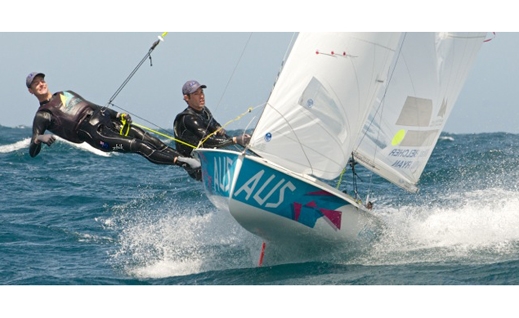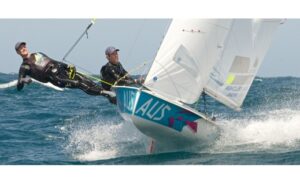

Who better to get help to improve your boat speed than Mat Belcher, multiple Olympic Gold medalist in the 470 class.
I have copied below excerpts from an interview that I did with Mat in 2017 while he was waiting at the airport to travel to yet another overseas regatta.
Brett: So the first question is about checking your speed. When is a good time to team up with another boat? Before the regatta and then before the start of each race?
Mat: I guess…we try and break it down into a general speed, which we try to do before coming to the events or any of the other training days prior. Most of our speed work is referenced.
An understanding of all the controls and all the tuning of the boat, so we have a really good knowledge of…if we’re changing a certain aspect of the tuning, then we know exactly what will happen.
I think that’s really important, so then you know, if we’re coming out for a race, we don’t have a lot of time.
Usually, you try and organize everything else, you’re trying to get into the right mindset or organize something, and it’s a bit of a rush, and it’s sort of whether or not you get onto the water.
Which means we don’t have the time. So, if we have an opportunity, we’ll try and partner with one of our squad members, who we know is good in those conditions.
We don’t have a set boat, we’ll know, okay, one guy’s really quick in light winds or really quick in strong wind and we’ll try and encourage them to do a bit of an upwind.
Most of the time, we’ll measure our speed off them. Usually about 30 minutes prior to start, and then as we get closer to the start, we start to really focus on the conditions and just get into a racing mindset.
FREE BOOK – MORE TIPS!
Brett: How much store do you put in the other boat’s speed? You mentioned a light-air day, and it’s someone that you respect for light-air speed, if you’re really failing against them, what do you do to try and improve, because that’s going to be heartbreaking, isn’t it?
Mat: The one thing about our sport is that it’s really hard to be good in all conditions.
You’ve got your favourite set of conditions that you know you’re going to perform well in, and you have a lot of confidence in. Then there are those conditions that you’re not good at.
Everyone has their favourite and you need to try and work out a lot of self-analysis we say we’re not very good in light wind, we need to improve in these conditions.
So basically we’ll copy them, watch them, do what we can and do as much training in those conditions as we can with them.
Then whether that’s during the event or not, we…classic examples, during the London Olympics we were struggling for boat speed with a team that was…had done a little bit more, a little bit heavier, a little bit different setup.
Even during the actual games we were still, refining our tuning and trying to maximize the speed.
Brett: How important is communication between crew members? I often hear that we don’t talk anywhere near enough in the boat. Do you guys discuss a lot of stuff, are you talking the whole time?
Mat: I think what’s really important in communication is critical in any boat race or really anything, and the communication that Will and I have is extremely, extremely important, but it’s more the actual type of communication, which is equally important.
Communication with Will and I, because we’ve done a lot of time together, we have really good synergy together.
It’s very, very subtle, and sometimes it’s not a lot, but it’s the right amount of communication for where we’re at.
Obviously, there are different levels, and different forms of communication, for us, we just try and be as efficient and as quiet as we can, in that sense, that just really creates precise communication between us.
We try not to do a lot. That’s just because we get out of our rhythm, we get out of our racing mindset if we’re talking all the time, it’s really, really hard to actually concentrate and to focus on the individual roles.
FREE BOOK – MORE TIPS!
Brett: I guess that relationship has developed, as you said, the longer you sail together, the less you need to talk I suppose, but you’re still communicating, even if you are not talking.
Mat: I find in a lot of boats particularly big boats or even in the dinghies when we talk about communication, a lot of guys just think you’ve just got to talk about everything.
Every single puff, every single shift, which is really important, but sometimes you’ve got to balance that level of concentration, particularly at our level, to really focus on the steering angle, focus on heel, focus on gust response and really just try to maximize speed.
If you’re constantly talking, you’re constantly getting distracted and the same as driving a car or you’re doing anything that requires a high level of concentration.
It’s very, very, difficult, but you also need to know where to go, so we practice quite a bit, particularly in a high-pressure racing environment that we’ve now got to know what each other’s thinking.
We have got to be on the same wavelength and have the same belief of where we’re going and tuning and all sorts of stuff, so we do that together.
We really try to maximize both of our different skill sets to make the right decisions and also get the best boat speed that we can for the day.
But we are really quite minimal, and some of the basic stuff we won’t actually even talk about it, we just know what will happen.


